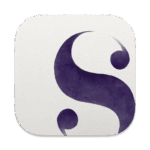Once I was asked on discord about writing tools for academic writing. This is the answer I gave — with minor changes and updates.
It is biased and undoubtedly incomplete.
While reading it, keep your own requirements and workflow in mind.

Scrivener
Pro
- offers an encapsulated “project” environment in which important links, documents, notes, etc can be stored with the main text, and you can attach notes and status information alongside
- Notes and status information can be exported or printed out separately
- works extremely well with bigger documents
- splitting the editor window horizontally or vertically to work with two documents side by side
- can break down longer documents in chapters or subchapters
- text layout can be completely decoupled from the writing process
- It is possible to write up to the last 5 minutes and then push the text through the “compile” process and receive a perfectly formatted document that can be sent out right away. If one has invested prior work into setting up the compile configuration — this has saved my procrastinating ass over and over again
- an active support community exists in the Literature & Latte forum
- templates exist for the most use-cases
- offers stats and goals, that are helpful when writing to a specific word count
- Integration with some third-party tools like, for example, Aeon Timeline, is offered
- available for macOS, Windows and iPadOS.
Con
- no truly good Zotero plugin exists
- yet, there are workarounds for some systems (for example macOS)
- the RTF format is proprietary, even if it can be read by many applications
- Scrivener is proprietary software and there is no guarantee that you will be able to open a scrivener project as it is, with the structure of the documents and additional information intact, in 10 years from now
- understanding the “compile” configuration can be difficult and needs some time to get acquainted with
- Scrivener is rarely offered by universities for their students; thus you’ll have to pay for it out of your pocket. Even though the price is bearable, it is an investment that has to be considered
- many people coming from word are not used to the separation of the writing process from the layout/formatting process and tend to struggle at the beginning
- no truly usable Linux version exists any more (I know that is a very niche problem. 😉)
- Scrivener is an option that should be considered if an enclosed project environment is beneficial
- For example: This is the binder containing 5 years of articles I’ve written for the (German) Linux Magazin, and besides the articles documents about the magazine’s style guides, ideas, and brainstorming and everything easily accessible in one place:
Zettlr
Pro
- works based on text only files with the Markdown markup language
- thus offers the best long-term archival properties of all those three options
- works well with bigger documents
- breaking down longer documents into chapters, subchapters/sub-documents and fusing them together in the export process — similar to Scrivener, — is possible
- but parts of bigger documents can also just toggle open or closed
- splitting the editor window horizontally or vertically to work with two documents side by side
- layout process and writing process is somewhat decoupled — but not 100% like with Scrivener
- fully open source and free of cost
- an active support community exists on Reddit, Discord and on a Forum
- export uses the popular and widely supported Pandoc tool
- popular among a certain crowd — 😉
- PDF export is thus filtered through LaTeX.
- LaTeX has been developed for professional print layout. That results in the best and most sophisticated looking document layout of all three options
- Zotero integration via the Zotero Better BibTeX plugin works seamlessly
- You can insert your sources without even taking the hands from the keyboard and without interrupting your writing process. You’ll just enter a “@” and then type the first few letters of the main author’s surname, and you’ll get a dropdown menu with matching sources.
- LaTeX has hundreds of add-ons. You can do anything with LaTeX and tackle even the most complex formatting requirements
- many universities and institutes offer LaTeX templates based on their requirements
- has a “snippets” system that gives you quick access to stuff you’ll need over and over again, like keywords, or metadata you like to add to your documents
- is developed by a sociologist and thus works especially well with workflows used in the humanities or social sciences
- offers helpful tools like a built-in Pomodoro timer
- you can add word count goals to documents
- available for macOS, Windows and Linux, but no mobile version exists
- Zettlr integrates LanguageTool and offers a Readability check. The control for style and grammar might be the best of all three options
- Zettlr supports Mermaid as diagramming language.
Con
- presently it lacks support for having split bibliographies (like for primary and secondary sources)
- of all three options, it is most likely the most “tech-y” option and thus maybe not the most easily approachable.
- understanding how Pandoc and LaTeX works can be a daunting task
- it lacks an enclosed “project” environment — like Scrivener, — and you can’t easily add ‘sidebar’ notes and status information. You can add notes inside a document, though, those won’t be visible in the export
- it is a small project by a single developer (with support of two more people since a couple of months) thus sometimes it can take some time until problems are resolved. (Major problems are fixed pretty quickly, though.)
- entering tables in Zettlr isn’t fun. Yet, there is a website to create Markdown tables, that works very well. You’ll just copy and paste the final table into your document.
Word
I’m not using Word. I haven’t used it for about three decades, if not longer. I’ll only go into Word at all, since it is the most common writing tool out there and most people will have prior experience with it.
For a lot, it will be even the only writing tool they have worked with — yet.
Pro
- Everybody and their dog uses Word; thus help is often easy to find
- The file standard is supported by many applications and (somewhat) open
- a good Zotero plugin exists
- plenty of templates exist, often offered by universities and institutes based on their individual standards
- most people already know how to work with Word
- most universities offer free access to Microsoft products for their students.
Con
- still has issues with bigger documents, especially if they contain many tables or images
- can become tedious to work with
- complex office document formats lack good long term archival capabilities
- layout isn’t separated from the writing process and can become a hassle
- even though everybody uses it, support for niche problems can be challenging to find
- lacks a sophisticated “project” environment
- only available on Windows and macOS, not on Linux systems.
Last updated:
Bildquellen
- Scrivener: Literature & Latte | All Rights Reserved
- Scrivener Binder Showing My Work for the Linux Magazin: Mela Eckenfels | CC BY-NC-SA 4.0 International
- Zettlr: Hendrik Erz | All Rights Reserved


